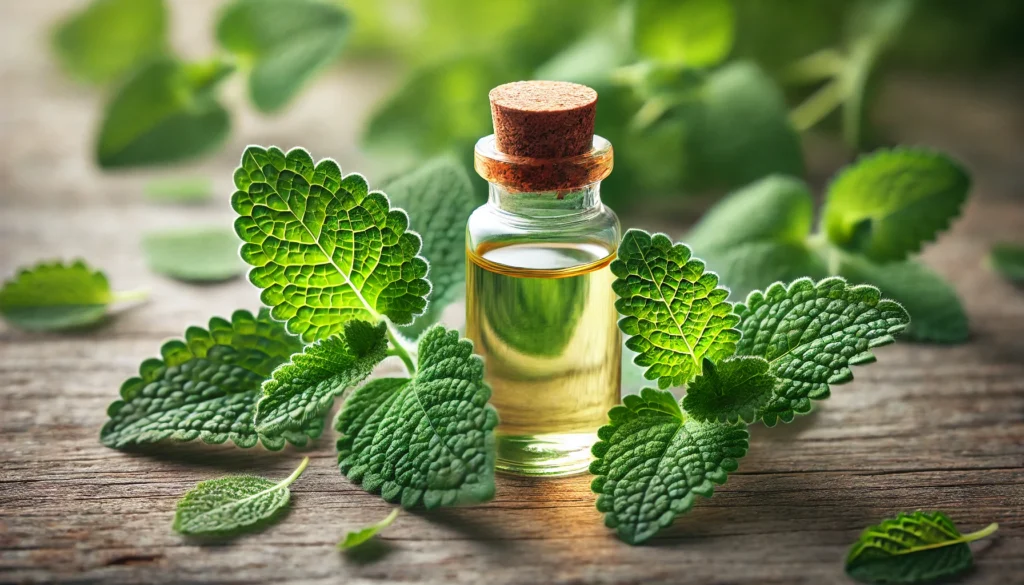Stress and anxiety are ubiquitous in today’s fast-paced world, leading many to seek natural remedies for relief. Lemon balm, a perennial herb from the mint family, has garnered attention as a potential solution. Known scientifically as Melissa officinalis, lemon balm is praised for its calming effects, making it a popular choice for those seeking a holistic approach to stress management. This article delves into the efficacy of lemon balm, examining its properties, scientific backing, and practical applications.
You may also like: Natural Supplements for Effective Anxiety Relief

What is Lemon Balm?
Lemon balm is a gentle yet potent herb traditionally used in European herbal medicine. Its leaves emit a lemony fragrance, and it has been employed for centuries to alleviate stress, promote sleep, and enhance cognitive function. Its versatility and therapeutic benefits are attributed to its rich composition of essential oils, flavonoids, and polyphenolic compounds.
Botanical Characteristics
Lemon balm is a perennial herbaceous plant that belongs to the mint family. It grows up to 70-150 cm tall, featuring square stems and opposite leaves that are broad and serrated. The plant produces small white flowers during the summer, which attract bees, hence its genus name ‘Melissa,’ meaning bee in Greek. Its lemon-scented leaves are the most used part in herbal preparations, valued for both their aroma and medicinal properties.
Chemical Composition
The therapeutic properties of lemon balm are attributed to its diverse chemical composition. Key constituents include essential oils like citronellal, geranial, and neral, which are known for their calming effects. Additionally, lemon balm contains flavonoids such as luteolin and quercetin, which have antioxidant properties. Polyphenolic compounds, including rosmarinic acid, contribute to its anti-inflammatory and neuroprotective effects, making it a versatile herb in natural medicine.
Cultivation and Harvesting
Cultivating lemon balm is relatively straightforward, making it a favorite among home gardeners and commercial producers alike. It thrives in well-drained soil with moderate sunlight and is resilient to pests and diseases. Harvesting typically occurs just before the plant flowers to ensure the highest concentration of essential oils. The leaves can be used fresh or dried for later use in teas, tinctures, and other preparations.
Historical Use of Lemon Balm
Historically, lemon balm has been used in teas, tinctures, and topical applications. The ancient Greeks and Romans valued it for its ability to uplift the spirit and improve mental clarity. During the Middle Ages, it was infused into wines to combat melancholy and revitalize the heart.
Ancient Traditions
In ancient times, lemon balm was revered for its therapeutic properties across various cultures. The Greeks and Romans often used it in their traditional healing practices, believing it to be a remedy for a range of ailments, from digestive issues to nervous disorders. Its uplifting fragrance was also thought to enhance mood and mental clarity, making it a staple in ancient herbal medicine.
Medieval Practices
During the Middle Ages, lemon balm gained prominence in European herbalism. Monks in monastic gardens cultivated it extensively, utilizing it in medicinal concoctions and infusions. It was a key ingredient in Carmelite water, a tonic made by Carmelite monks to treat headaches and nerve pain. This era marked a significant period where lemon balm was used not just for physical ailments but also for emotional and spiritual well-being.
Modern Applications
Today, lemon balm continues to be a vital herb in alternative and complementary medicine. Its use has expanded beyond traditional teas and tinctures to include modern preparations like capsules and essential oils. The herb is now widely recognized for its calming effects and is often included in stress-relief supplements and wellness products. Its enduring popularity underscores its versatility and efficacy in promoting mental and emotional health.

Does Lemon Balm Help Anxiety?
The primary question on many minds is: does lemon balm help anxiety? Scientific research provides insightful answers.
Mechanism of Action
Lemon balm’s anxiolytic effects are primarily linked to its interaction with the gamma-aminobutyric acid (GABA) system. GABA is an inhibitory neurotransmitter in the brain that reduces neuronal excitability, promoting relaxation and calmness. By enhancing GABA activity, lemon balm may help mitigate anxiety symptoms.
Interaction with Neurotransmitters
Lemon balm’s ability to alleviate anxiety is closely tied to its interaction with neurotransmitters in the brain. By enhancing the activity of GABA, it helps to reduce neuronal excitability and promotes a sense of calm. This mechanism is similar to that of certain anti-anxiety medications, but with the added benefit of being a natural remedy. Additionally, lemon balm may influence other neurotransmitters such as serotonin and dopamine, further contributing to its mood-stabilizing effects.
Impact on Stress Hormones
Research suggests that lemon balm may also impact the body’s stress response by modulating levels of cortisol, the primary stress hormone. By reducing cortisol levels, lemon balm helps decrease the physiological effects of stress, such as elevated heart rate and blood pressure. This dual action on neurotransmitters and stress hormones makes lemon balm a comprehensive approach to managing anxiety.
Synergistic Effects with Other Herbs
Lemon balm is often used in combination with other calming herbs like valerian root and chamomile to enhance its anxiolytic effects. These combinations can create a synergistic effect, offering a more profound sense of relaxation and stress relief. This approach is particularly beneficial for individuals who require a more potent solution for severe anxiety.
Research Studies
A notable study published in the Journal of Phytotherapy Research investigated lemon balm’s effect on anxiety. Participants who consumed lemon balm extract reported significant reductions in anxiety and stress levels compared to a placebo group. The study concluded that lemon balm holds promise as a natural remedy for anxiety disorders.
Clinical Trials
Several clinical trials have been conducted to evaluate the effectiveness of lemon balm in treating anxiety. These studies typically involve participants with generalized anxiety disorder or stress-related symptoms. Results consistently show that lemon balm extracts can lead to significant reductions in anxiety, often comparable to conventional medications. Such findings underscore the potential of lemon balm as a viable alternative or adjunct to traditional anti-anxiety treatments.
Meta-Analyses and Reviews
Meta-analyses and systematic reviews of existing research provide further support for lemon balm’s efficacy. These comprehensive evaluations compile data from multiple studies, offering a more robust picture of the herb’s benefits. Reviews often highlight lemon balm’s positive impact on mood, stress reduction, and cognitive performance, reinforcing its role as a natural anxiolytic.
Limitations and Future Research
While current research is promising, there are limitations to consider. Many studies have small sample sizes or are short in duration, which can impact the generalizability of the findings. Future research should aim for larger, more diverse populations and longer study periods to fully understand the long-term effects and safety of lemon balm for anxiety.
Personal Testimonials
Anecdotal evidence is abundant, with numerous individuals claiming, “lemon balm cured my anxiety.” While personal testimonials should be considered with caution, they often provide valuable insights into the herb’s potential benefits.
User Experiences
Many users report experiencing a sense of calm and reduced anxiety after incorporating lemon balm into their daily routine. These experiences are often shared in online forums and health communities, highlighting the herb’s potential as a natural anxiolytic. Personal stories provide a relatable perspective on how lemon balm can make a tangible difference in managing stress and anxiety.
Case Studies
Case studies further illustrate lemon balm’s benefits. For instance, a participant with generalized anxiety disorder reported significant improvements in anxiety levels and overall well-being after using lemon balm extract for eight weeks. Such case studies, while limited in scope, add to the growing body of evidence supporting lemon balm’s efficacy.
Limitations of Anecdotal Evidence
While personal testimonials can be compelling, they should be approached with caution. Anecdotal evidence does not undergo the rigorous scientific scrutiny that clinical trials do, and individual experiences can be influenced by a variety of factors. It’s important to balance these stories with scientific research to form a well-rounded view of lemon balm’s potential.
Does Lemon Balm Work for Anxiety?
Given the scientific and anecdotal evidence, it appears that lemon balm does work for anxiety, at least for some individuals. However, individual responses may vary, and it is crucial to approach any supplement with informed caution.
Dosage and Administration
Lemon balm is available in various forms, including teas, capsules, and tinctures. The optimal dosage can vary depending on the form and concentration of the product. As a general guideline, starting with a low dose and gradually increasing it as needed is advisable. Consulting a healthcare professional can help determine the appropriate dosage tailored to individual needs.
Forms of Lemon Balm
Lemon balm can be consumed in several forms, each offering unique advantages. Teas are a popular choice for their soothing ritual and immediate calming effects. Capsules and tinctures provide a more concentrated dose, ideal for those seeking a stronger effect or who prefer not to consume large volumes of liquid. Understanding the different forms allows individuals to choose the best option for their lifestyle and needs.
Recommended Dosages
The recommended dosage of lemon balm varies depending on the form and intended use. For teas, 1.5 to 4.5 grams of dried leaves per day is common. Capsules typically contain 300-500 mg of lemon balm extract, with a recommended intake of one to three capsules daily. Tinctures usually advise 2-3 ml, taken up to three times a day. It’s important to start with a lower dose and adjust based on individual response and guidance from a healthcare professional.
Combining with Other Supplements
Lemon balm can be used in conjunction with other supplements to enhance its effects. For instance, combining it with valerian root or passionflower may amplify its calming properties. However, it’s essential to consult with a healthcare professional before combining supplements to avoid potential interactions and ensure safe and effective use.
Potential Side Effects
While lemon balm is generally well-tolerated, some individuals may experience mild side effects such as gastrointestinal discomfort or allergic reactions. It is essential to monitor one’s response and discontinue use if adverse effects occur.
Common Side Effects
The most common side effects of lemon balm are mild and may include nausea, dizziness, or headaches. These symptoms are typically temporary and resolve on their own. Monitoring one’s body response when starting lemon balm is crucial to identify any adverse reactions early.
Allergic Reactions
Although rare, some individuals may experience allergic reactions to lemon balm. Symptoms can include skin rashes, itching, or difficulty breathing. If any of these occur, it’s important to discontinue use immediately and seek medical attention. Those with known allergies to plants in the mint family should exercise caution when using lemon balm.
Interactions with Medications
Lemon balm may interact with certain medications, including those for thyroid disorders and sedatives. It’s important to consult with a healthcare provider before starting lemon balm, especially if currently taking prescription medications. This ensures safety and prevents potential adverse interactions that could compromise health.

Practical Applications of Lemon Balm
Incorporating lemon balm into your wellness routine can be both simple and beneficial. Here are some practical tips for using lemon balm effectively:
Herbal Tea
Brewing lemon balm tea is a popular method of consumption. Simply steep fresh or dried leaves in hot water for 5-10 minutes. Adding honey or lemon can enhance the flavor.
Brewing Techniques
The quality of lemon balm tea can be influenced by the brewing technique. Using fresh leaves provides a more robust flavor, while dried leaves offer convenience and longevity. For a richer taste, consider using a French press or teapot with an infuser. Experimenting with steeping time and water temperature can also yield different flavor profiles and intensities.
Flavor Enhancements
To enhance the flavor of lemon balm tea, consider adding natural sweeteners like honey or stevia. A slice of fresh lemon or lime can complement the herb’s citrusy notes. For a more complex taste, try blending lemon balm with other calming herbs such as chamomile or lavender.
Benefits of Regular Consumption
Regular consumption of lemon balm tea can contribute to long-term stress reduction and improved sleep quality. Drinking a cup in the evening may help unwind after a long day, promoting relaxation and restful sleep. Consistent use can help integrate lemon balm’s calming effects into daily life, enhancing overall well-being.
Supplements
Lemon balm supplements, available in capsule or tincture form, offer a convenient way to incorporate the herb into your daily regimen. Ensure you choose high-quality products from reputable brands to maximize efficacy and safety.
Selecting Quality Products
When selecting lemon balm supplements, it’s important to choose high-quality products from reputable brands. Look for supplements that are standardized to contain a specific percentage of active ingredients, such as rosmarinic acid. Certifications from third-party testing organizations can provide assurance of purity and potency.
Incorporating into Routine
Incorporating lemon balm supplements into a daily routine can be simple and effective. Consider taking them at the same time each day, such as with breakfast or before bedtime, to establish consistency. Pairing with other wellness practices, like meditation or yoga, can enhance the calming effects of the supplement.
Monitoring Effects
When starting a lemon balm supplement, it’s important to monitor its effects on mood and anxiety levels. Keeping a journal to track changes can provide valuable insights into how the herb is working. This information can help adjust dosage and ensure the supplement is meeting individual needs effectively.
Aromatherapy
Lemon balm essential oil can be used in aromatherapy to promote relaxation. Diffusing the oil or adding a few drops to a warm bath can create a soothing atmosphere.
Diffusion Techniques
Diffusing lemon balm essential oil can create a calming environment in any space. Using an essential oil diffuser disperses the aroma throughout the room, providing continuous stress relief. Experimenting with different diffusion methods, such as reed diffusers or ultrasonic diffusers, can offer varying intensities and durations of fragrance.
Bath Additives
Adding a few drops of lemon balm essential oil to a warm bath can enhance relaxation and promote mental clarity. Combining it with other soothing oils like lavender or chamomile can amplify the calming effects. This practice can be particularly beneficial before bedtime to encourage restful sleep.
Inhalation Practices
Inhalation is another effective way to utilize lemon balm essential oil. Applying a drop to a handkerchief or cotton ball allows for easy inhalation throughout the day. This method can be particularly useful in stressful situations, providing immediate relief and promoting a sense of calm.
Conclusion
Lemon balm presents itself as a viable herbal solution for those seeking to alleviate stress and anxiety naturally. While scientific research supports its efficacy, individual experiences may differ. As with any supplement, it is crucial to approach lemon balm with a balanced perspective, considering both its benefits and limitations.
Incorporating lemon balm into a comprehensive wellness strategy, alongside lifestyle modifications and professional guidance, can pave the way for improved mental well-being. Whether you’re a fitness enthusiast, health enthusiast, or medical patient, exploring the potential of lemon balm may offer the relief and calm you seek in today’s hectic world.
Holistic Wellness Strategies
Integrating lemon balm into a holistic wellness strategy involves more than just taking a supplement. Combining it with lifestyle practices such as regular exercise, a balanced diet, and mindfulness techniques can enhance its benefits. This comprehensive approach can lead to more sustainable improvements in mental health and overall well-being.
Professional Guidance and Monitoring
Consulting with healthcare professionals can provide valuable insights and guidance when incorporating lemon balm into a wellness routine. Professionals can offer personalized advice on dosage and usage, ensuring safe and effective use. Regular monitoring and adjustments, based on individual response, can optimize results and minimize potential risks.
Exploring Future Potential
As research continues to explore the potential of lemon balm, new applications and benefits may emerge. Staying informed about the latest scientific findings can enhance understanding and utilization of this versatile herb. Embracing lemon balm as part of a broader commitment to natural health can open new avenues for stress relief and emotional balance.
Further Reading:
The Health Benefits of Lemon Balm
What to know about lemon balm tea
Important Note: The information contained in this article is for general informational purposes only, and should not be construed as health or medical advice, nor is it intended to diagnose, prevent, treat, or cure any disease or health condition. Before embarking on any diet, fitness regimen, or program of nutritional supplementation, it is advisable to consult your healthcare professional in order to determine its safety and probable efficacy in terms of your individual state of health.
Regarding Nutritional Supplements Or Other Non-Prescription Health Products: If any nutritional supplements or other non-prescription health products are mentioned in the foregoing article, any claims or statements made about them have not been evaluated by the U.S. Food and Drug Administration, and such nutritional supplements or other health products are not intended to diagnose, treat, cure, or prevent any disease.


